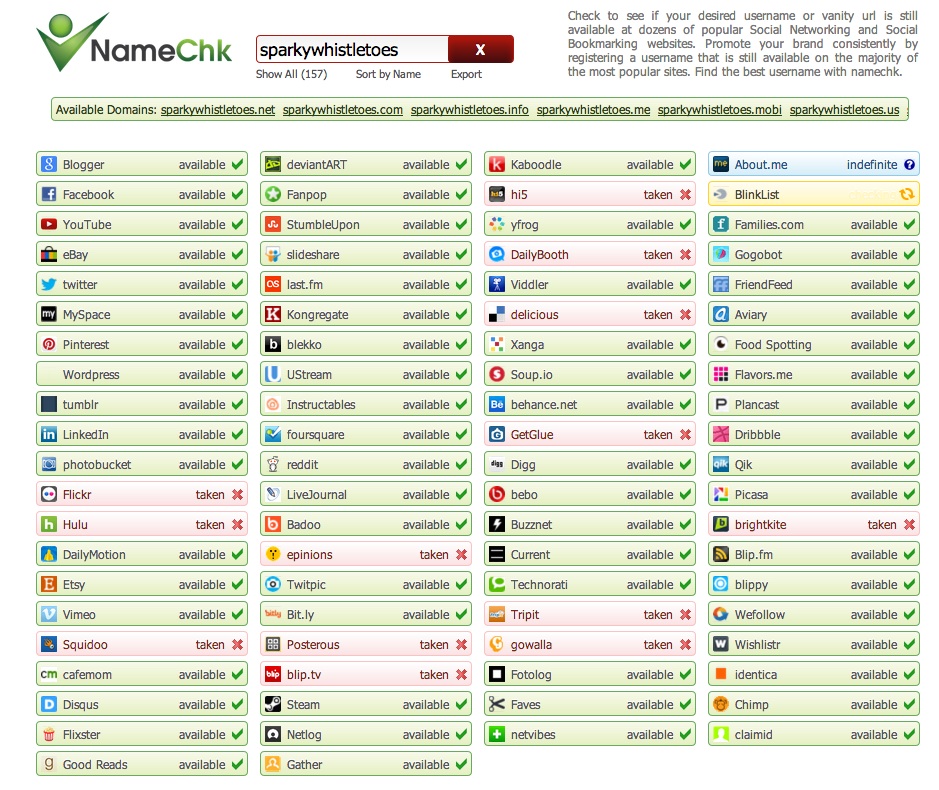Tools for Writers: Namechk
by Cat Rambo
One of the tools I mention to students in my online class Building An Online Presence for Writers is a website called Namechk. You can input the user name you want to use and see whether or not it is taken on a number of social networks and well as domains. Here’s an example:
 Networks where the name is not taken are shown in green; networks where the name is not available are shown in red. As you can see, although I have entered a reasonably original name, Sparkywhistletoes, it is already taken on several networks, including Flickr, Hulu, and Squidoo.
Networks where the name is not taken are shown in green; networks where the name is not available are shown in red. As you can see, although I have entered a reasonably original name, Sparkywhistletoes, it is already taken on several networks, including Flickr, Hulu, and Squidoo.
There are 157 networks listed, although that may have changed since the taking of that screenshot. Am I seriously suggesting that you be registered on each one? Isn’t that just a form of cat-vacuuming, one of those activities that seems productive yet uses up an unreasonable amount of time?
Yes, actually. Although I’m not suggesting you do it in one fell swoop, but rather that you pick away at it, bit by bit. This falls into the category of what I call productive procrastination, small tasks that can be done while watching television or waiting for a phone call.
To me, the benefits accrued by going through this task are several, particularly in a period when the author often needs to step in and personally provide some of their book marketing.
-
This increases your discoverability, makes it easy for your readers to find you. You do not need to be selling your books on this site. A pointer to your website, which does have means for selling your books, is sufficient. So you’ll want to fill out your profile on each of these networks. Luckily this usually doesn’t take a lot of time. Have a brief bio ready that can be used on multiple networks. Some will let you sign in with Facebook or Twitter, and will automatically import your profile information from that network.
-
This also increases your discoverability in terms of search engines, such as Google or Bing. The link to your website on a social network profile adds to its search engine index ability.
-
Maintaining profiles on networks helps you reach new readers, the ones that might not find you on Facebook because they’re not there. Many of these networks have groups devoted to science fiction and fantasy.
-
These profiles provide an additional place to market yourself, when you’re making a big push, such as when a new book is launched.
-
Finally, securing your name on such networks prevents anyone from creating an account and pretending to be you, which is a rare problem, but does sometimes occur.
Bearing all of that in mind, here are some best practices to follow when signing up for new social networks.
-
Do take the time to fill out the profile, with at least your picture, a brief description of who you are, and a link to your website.
-
Be mindful of your password. Don’t pick one that is easily guessed, and if possible create one that includes a combination of letters, numbers, and special characters.
-
If you are worried about spam, create an email account that such notifications go to, that you can check periodically. If you are a Gmail user these notifications will probably automatically go in your social tab.
-
Automate what you can. pick your main social network (I suggest Facebook or Twitter) and see if you can set it off so an update to one of those automatically propagates out to other networks. For example, my Twitter feed is set to automatically post to Facebook. Don’t expect this capability of all networks, so far not all of them have it.
-
In filling out the list, you may find that it’s efficient to do it by category, such as all of the video centered networks at one time.
As with much online activity, this is not mandatory, and one should never neglect writing in favor of marketing. But if you are thinking about your online presence, and want one way to make it stronger, this is a possibility.
•••

Nebula and World Fantasy Award-nominated writer and SFWA member Cat Rambo just released her first nonfiction book, Creating an Online Presence (Careerbuilding for Writers). Her short stories have appeared in such places as Asimov’s, Tor.com, and Clarkesworld Magazine. She is the former editor of Fantasy Magazine. Find links to her work at http://www.kittywumpus.net.


